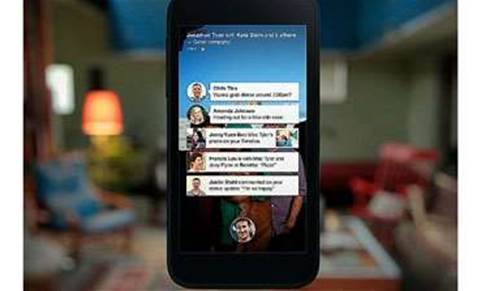Mark Zuckerberg's teen years are still a visceral reality rather than the happy memory they represent for most of his of his Silicon Valley compadres. So he understands better than most that text has replaced voice as the primary comms preference for today's teens. That's the simplest way to understand what he's up to with Facebook Home, his company's new Android smartphone virus.
"Hey, how about we listen in on your phone calls so we can send you advertising based on your conversations. Nothing creepy about that."
The "conversation" is text, not voice, but you get the picture.
Now, and this is important - Facebook has not said it will scan chats and sell ads against the content - but it hasn't said it won't either.
The much mooted Facebook Phone is no phone at all, but rather a software interstitial between the operating system and the app - one app to rule them all basically - and most likely built on a slightly forked version of Android that recasts the smartphone as people centric rather than app centric according to Zuckerberg.
A key feature of Home is Chat Heads - a social feed on your screen that goes right on sharing all of your friends social activity even as you are engaging with other apps. Sensibly, no one at Facebook recalled its "frictionless sharing" theme from a few years back at the launch but that basically is the philosophy behind it. Markets certainly liked the news, Facebook's shares were up over three per cent by the close of day.
As Techcrunch noted this morning, "Mark [Zuckerberg] explained that Messaging shouldn’t be treated like any other app, though it often is treated that way in the current ecosystem…If you page through to another app, like a game or Instagram, the ‘chat head’ (as it were) stays right there in the corner, ready and waiting for interaction. The chat head even has an unread count to show how many photos you’ve missed.”
Facebook partnered with HTC for the launch - on a device costing $US99 bucks ($A94.50) , but Samsung is also on board at the start. It will be available for download generally on April 12.
The decision to opt for Android speaks to much more than simply a decision to reach into the broader teen market.
Instead Facebook is challenging both Apple (we don't actually need you) and also Google (thanks for the channel and the operating system, now get out my limelight)
US tech site Pando Daily said it best, "Facebook has positioned itself between consumers and the core Android operating system and cut Google out of its own platform."
It is all hazily reminiscent of an earlier era. Who remembers "a computer on every desktop "? In the always connected socially mobile world of the smartphone Mark Zuckerberg wants Facebook on every eyeball, every spare moment of the day.




.jpg&h=142&w=230&c=1&s=1)


_(27).jpg&h=142&w=230&c=1&s=1)





.jpg&w=100&c=1&s=0)








_(1).jpg&q=95&h=298&w=480&c=1&s=1)


